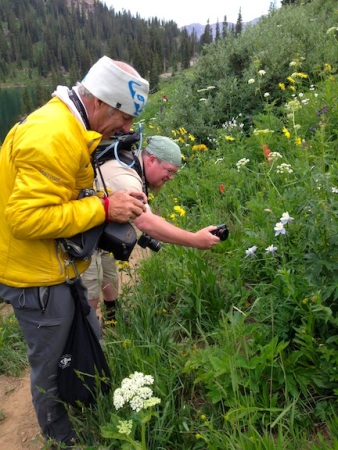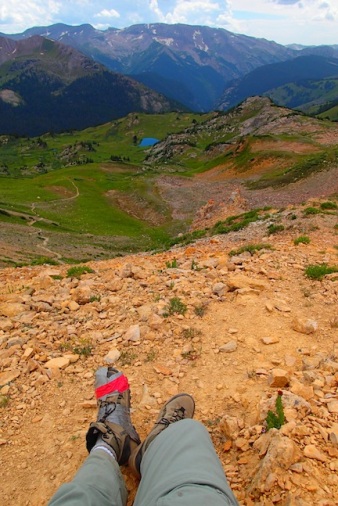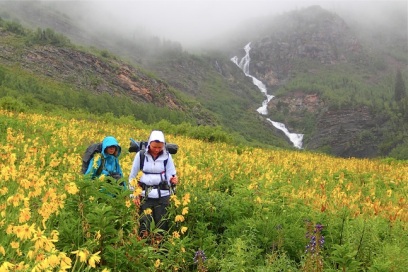I just returned from meeting new friends and together, exploring new territory. It was a challenging but memorable experience and I have some new gadgets, a bucketload of pictures and wonderful memories to show for it.  I’m very glad I did it even though the night I returned to a hotel after backpacking in the high elevations for four days I told my wife that if I ever mention doing something like that again to just slap me. Now, a few weeks have passed and I feel ready to head into the Wilderness again. I’ve already bought a new pair of boots—good boots with good soles! But that’s another story.
I’m very glad I did it even though the night I returned to a hotel after backpacking in the high elevations for four days I told my wife that if I ever mention doing something like that again to just slap me. Now, a few weeks have passed and I feel ready to head into the Wilderness again. I’ve already bought a new pair of boots—good boots with good soles! But that’s another story.
We had five participants and four leaders on this expedition—a pretty good teacher student ratio, and things went well. The altitude sickness I was fearing did not make an appearance, after hiking miles each day from 8,000-feet to over 12,000-feet I had no muscle soreness, each morning I felt refreshed and ready to go again, my new tent was just right (and I would soon learn that it could withstand hours of heavy rain with no problem). Things went well in the high country of Colorado.
 There were nine of us on this trek to photograph wildflowers, lakes, and rocky peaks, but one person seemed to be missing. And not just from the hiking and camping part, but from the very beginning, from the first communication. That was Abraham. You know him – Abraham Maslow.
There were nine of us on this trek to photograph wildflowers, lakes, and rocky peaks, but one person seemed to be missing. And not just from the hiking and camping part, but from the very beginning, from the first communication. That was Abraham. You know him – Abraham Maslow.
There were several issues where Maslow’s assistance could have made the trip more enjoyable and us more relaxed and better prepared. Maslow, a psychologist from the middle of last century, defines seven ‘levels’ of psychological accomplishment and explains that a person must pass through each level, or feel comfortable with each one, before he can move to the next higher level. The highest are understanding, aesthetic and self-actualization (Where you really want to be on a mountaintop experience!). The lower levels are the basic needs of safety/security and belonging. Maslow says that if you are continually concerned with your safety and well-being you will think of little else – your first instinct is to survive and to know what is going to happen to you.
 We weren’t concerned about absolute survival, though the risk of not surviving is always present in Wilderness. But we did have to be prepared by carrying our own food and shelter, clothes for comfort, warmth, rain, and of course perhaps the most important element for getting in, out, and about – boots. Plus, participants were from all over the country – from California to Ohio, several had never been to Colorado or in this type of high country. Solid information about where, when and how was critical for our preparedness and psychological comfort – Maslow’s first level. Early communication was sketchy and trip details were kept a mystery for a month, but as departure time drew near they came through with locations and elevations so we could look up weather (the area was getting a lot of rain, and that was a worry), and then we received an equipment list, and a few days prior to the event, they answered questions.
We weren’t concerned about absolute survival, though the risk of not surviving is always present in Wilderness. But we did have to be prepared by carrying our own food and shelter, clothes for comfort, warmth, rain, and of course perhaps the most important element for getting in, out, and about – boots. Plus, participants were from all over the country – from California to Ohio, several had never been to Colorado or in this type of high country. Solid information about where, when and how was critical for our preparedness and psychological comfort – Maslow’s first level. Early communication was sketchy and trip details were kept a mystery for a month, but as departure time drew near they came through with locations and elevations so we could look up weather (the area was getting a lot of rain, and that was a worry), and then we received an equipment list, and a few days prior to the event, they answered questions.
 They did a good job of selecting a meeting place that was easy to find. We were able to buy last minute items and organize for the drive to the edge of the Wilderness. Once there, with packs on our backs, we gathered to glance at a map and discuss where we were going, then, in a slight rain, we followed the leader off into the wild. We walked up and up, and up … and up. Level ground doesn’t exist here and every step is paid for with a deep breath less than half full of the oxygen I’m used to at 350 MSL. Over about four hours we climbed from 7,000 feet to 8,500 feet to our campsite at Geneva Lake.
They did a good job of selecting a meeting place that was easy to find. We were able to buy last minute items and organize for the drive to the edge of the Wilderness. Once there, with packs on our backs, we gathered to glance at a map and discuss where we were going, then, in a slight rain, we followed the leader off into the wild. We walked up and up, and up … and up. Level ground doesn’t exist here and every step is paid for with a deep breath less than half full of the oxygen I’m used to at 350 MSL. Over about four hours we climbed from 7,000 feet to 8,500 feet to our campsite at Geneva Lake.  In our group some people were fast hikers and some slower. There was no organized stopping place, no stop for conversation, food or water. This surprised me as I have been trained that in physical activity you want to stay ahead of your metabolism and not use up your store of energy. One rule is: “drink every 20-minutes, eat every 40.” Stopping and gathering the group every hour, reminding folks to eat a granola bar and take a drink, and using the time to check on everyone would have strengthened the appearance of good organization and we would have all felt better, stronger, and cared for. Once you grasp that drink/eat concept it’s not hard to apply in many situations. The ‘drink 20, eat 40’ concept is a good one for day hiking or other activity anywhere. It keeps you hydrated and your energy level up.
In our group some people were fast hikers and some slower. There was no organized stopping place, no stop for conversation, food or water. This surprised me as I have been trained that in physical activity you want to stay ahead of your metabolism and not use up your store of energy. One rule is: “drink every 20-minutes, eat every 40.” Stopping and gathering the group every hour, reminding folks to eat a granola bar and take a drink, and using the time to check on everyone would have strengthened the appearance of good organization and we would have all felt better, stronger, and cared for. Once you grasp that drink/eat concept it’s not hard to apply in many situations. The ‘drink 20, eat 40’ concept is a good one for day hiking or other activity anywhere. It keeps you hydrated and your energy level up.
 This was a photo safari so we stopped often to photograph (and breathe!). The leaders were very good at letting us move at our own pace and they split up to be sure we each has a leader with us – nice, subtle leadership. Well done.
This was a photo safari so we stopped often to photograph (and breathe!). The leaders were very good at letting us move at our own pace and they split up to be sure we each has a leader with us – nice, subtle leadership. Well done.
At the campsite at the end of each day we needed individual time to organize, refill and purify water, and do several other things as the daylight faded. It’s here that the second level of Maslow’s Hierarchy of Needs left us. We were left to our own devices to fix dinner and ramble about. Our tents were close enough. It’s not like we were hundreds of yards apart (more like five feet), yet we needed some structure to pull us together psychologically.
 A campfire would do the trick. We’d gather around, share some food, tell some stories, ask about tomorrow, and generally laugh, talk and bond around a good old traditional campfire. But we couldn’t have a campfire. Instead, we each prepared our water, lit our stove, and prepared our meal more or less alone near our tent. The centerpiece of a camping experience, the social focal point of a campfire, was missing and not replaced, and there is the flaw.
A campfire would do the trick. We’d gather around, share some food, tell some stories, ask about tomorrow, and generally laugh, talk and bond around a good old traditional campfire. But we couldn’t have a campfire. Instead, we each prepared our water, lit our stove, and prepared our meal more or less alone near our tent. The centerpiece of a camping experience, the social focal point of a campfire, was missing and not replaced, and there is the flaw.
There has been a lot written about the need for a campfire in the backcountry—and the consensus is that it’s not needed. A backpacker doesn’t need to leave the charred remains of nightly campfires along his path through the backcountry. A stove is cleaner and more efficient for cooking. But in a group, the campfire is not for cooking, rather, it creates a social gathering place where for 10,000 years stories have been told and societies, tribes, and campers have bonded. Without a campfire how do you create that focal point where stories are told and ‘belonging’ is strengthened?
 Perhaps simply ask everyone to bring their stoves to a central place and cook and eat together. Perhaps select the central gathering place first, then set the tents so that the gathering place is recognized and established. Perhaps designate someone to have a stove going each morning to boil water and let everyone know to take their water there to boil, and have coffee and oatmeal, tea and Pop-Tarts, together to start the day and get the latest info on the day’s trek. Perhaps have an evening meeting time where we drink hot chocolate and share stories, discuss events of the day, and go over maps and routes for the next day. All this is merely leadership bringing the group together, being inclusive, and asking leading questions to motivate discussion.
Perhaps simply ask everyone to bring their stoves to a central place and cook and eat together. Perhaps select the central gathering place first, then set the tents so that the gathering place is recognized and established. Perhaps designate someone to have a stove going each morning to boil water and let everyone know to take their water there to boil, and have coffee and oatmeal, tea and Pop-Tarts, together to start the day and get the latest info on the day’s trek. Perhaps have an evening meeting time where we drink hot chocolate and share stories, discuss events of the day, and go over maps and routes for the next day. All this is merely leadership bringing the group together, being inclusive, and asking leading questions to motivate discussion.
Those evening and morning times as a group are critical for review, bonding and planning—cross pollinating Maslow’s defined need for belonging and acceptance as a full member of the group.
 Now, no one was an outcast. We were a good group, concerned, helpful, sensitive to others, observant, conversive…but there was a slight feeling of not knowing much about each other and an awkwardness of having to ask, which could have been overcome with some evening ‘belonging time’ around dinner together.
Now, no one was an outcast. We were a good group, concerned, helpful, sensitive to others, observant, conversive…but there was a slight feeling of not knowing much about each other and an awkwardness of having to ask, which could have been overcome with some evening ‘belonging time’ around dinner together.
 In spite of these small flaws, we each had a memorable experience: we explored new territory as we climbed high trails to crystal clear lakes, fields of wildflowers, and dramatic views. No one was left behind, everyone was encouraged, no one got sick or injured, and thousands of pictures were taken. Even with Maslow missing around a campfire, that’s got to be success.
In spite of these small flaws, we each had a memorable experience: we explored new territory as we climbed high trails to crystal clear lakes, fields of wildflowers, and dramatic views. No one was left behind, everyone was encouraged, no one got sick or injured, and thousands of pictures were taken. Even with Maslow missing around a campfire, that’s got to be success.

That’s interesting because people usually think of bonding on a backwoods trip as an automatic thing, rather than as something that needs to be cultivated, even subtly.
This is a good example and reminder of what can be lost when we don’t address people’s needs. Thanks!
Colorado is such a beautiful place. Your pictures remind me of trips past. Thank you for sharing. (I know I’m late…)